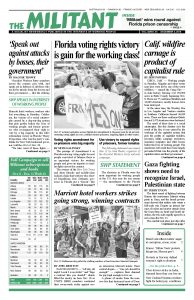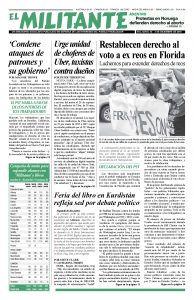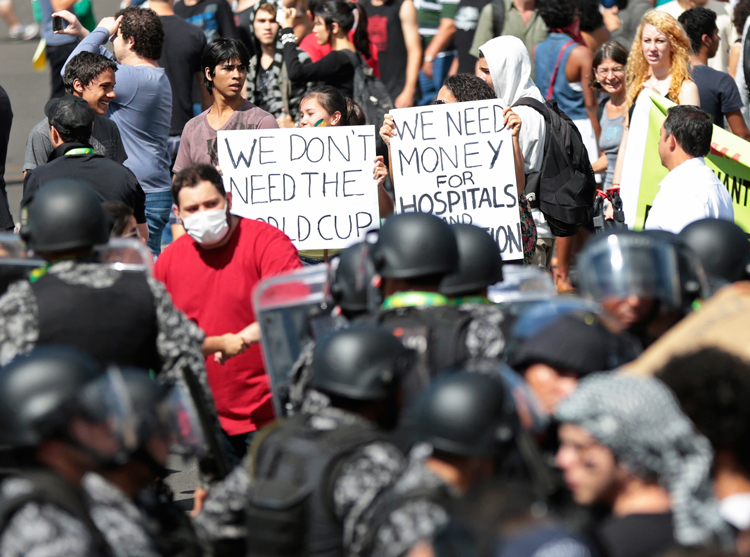In the midst of a deepening economic, social and moral crisis, accentuated by widespread government corruption, Jair Bolsonaro of the Social Liberal Party was elected Oct. 28 in a runoff against Workers’ Party candidate Fernando Haddad. The liberal media, from Brazil to the U.S., claimed Bolsonaro was the “Trump of the tropics,” and his election meant a fascist was in office. They blamed the workers and peasants who voted for him.
Bolsonaro, a former army captain, tapped into widespread working-class disenchantment with bourgeois politicians. He presented himself as an outsider — even though he has been in Congress for 27 years. He swore to crack down on crime and corruption, pledging he would wash the “scum” away. He coupled anti-crime demagogy with saying he would bring order to a corrupt political system.
Bolsonaro “was the only one that wasn’t corrupt,” Edimar Passos de Souza, a 51-year-old security guard who lives in a working-class neighborhood in Sao Paolo, told the press. De Souza said he had voted for the Workers’ Party in the four previous presidential elections.
Many longtime politicians were swept out of office, including 75 percent of standing senators. Among them was former President Dilma Rousseff. She was in office from 2011 until being impeached in 2016 on accusations of breaking fiscal laws and responsibility for a massive bribery scandal that took place under her watch, involving politicians and bosses from major construction companies and the state-run oil company Petrobras.
Bolsonaro was a constant target of liberal media criticism during the campaign for crude offensive remarks against women, Afro-Brazilians and gays; for defending the use of torture; and praising the military dictatorship that had ruled Brazil from 1964 to 1985.
Bolsonaro’s racist and anti-women slurs — many of which dated back years — disgusted many workers, but at the same time his tough-on-crime and anti-corruption demagogy appealed to them. There were 64,000 murders in Brazil last year. Some working people expressed concern, however, when Bolsonaro said he would give cops “more latitude” to kill criminals. Police brutality is rife in Brazil. In 2017 cops killed some 5,000 people, most in working-class neighborhoods.
“I am not just thinking about myself, nor worrying if he [Bolsonaro] will accept my [sexual] orientation,” David Trabuco told El Clarín. “I am worried about crime and health.” Trabuco is gay and an evangelical Christian who lives in Brasilia.
Bolsonaro won the runoff election with 55.2 percent of the vote. Haddad got 44.9 percent.
Haddad became the Workers’ Party’s presidential candidate after a court banned former President Luis Inácio Lula da Silva from running. Da Silva, who was leading the polls from a prison cell, is currently serving a 12-year sentence for bribery.
Lula had served as president from 2003 to 2010. He was well-known by workers as the former head of the Metalworkers’ Union who had helped lead strikes and social battles and helped found the Workers’ Party.
Haddad tried to tap into Lula’s popularity. His “A Happy Brazil Again” campaign presented the Workers’ Party as more capable of getting Brazil’s capitalist economy out of the dumps. But he didn’t campaign as a candidate for working people. He and his supporters on the left ran as champions of “identity politics,” saying that Bolsonaro’s election would lead to a backlash against homosexuals, women, blacks and other minorities. But the rampant crime, corruption and harsh reality of life for millions brought Bolsonaro to power.
A rise of fascism?
The radical and middle-class left in Brazil and beyond see Bolsonaro’s election as part of what they claim is a rise of fascist and reactionary currents worldwide. They point to the support he received among more conservative middle-class layers, former military officers, and of millions of followers of the growing evangelical church as proof. They fail to mention the fact that evangelical church members and large sections of the middle class also voted for Lula and Rousseff when they were elected.
In the absence of a fighting working-class leadership, millions of workers in Brazil look to bourgeois elections for a way out of the crisis of capitalism. They voted first and foremost in hopes something will be done against the breakdown of the social order — the crime epidemic, corruption and political privilege. So millions held their noses and voted for Bolsonaro. But they won’t get any relief from him, or any other politician seeking to represent the capitalist class.
Until working people end the economic and social system that breeds the conditions for crime — capitalism — bourgeois politicians will take turns trying to convince workers they are the best ones to address the problems.
The victims of the rulers’ “anti-crime” offensive are the workers themselves. Between 2000 and 2015 Brazil’s prison population more than doubled to 725,000, with the main cause of imprisonment being minor drug offenses.
Workers’ Party’s ‘economic miracle’
Brazilian bosses and politicians benefited from a commodity exports boom that marked the country’s economy until 2013. The expansion was part of a surge in some of the biggest so-called emerging markets — what Goldman Sachs dubbed the BRICS: Brazil, Russia, India, China and South Africa — for much of the time the Workers’ Party was in office.
Goldman Sachs promoted “investment” in the BRICS, whose growth, they said, would make them leaders in world capitalist expansion and boost profits for bosses and bankers.
Much of the hype was centered on Brazil, the fifth most populous country in the world, with 209 million people compared to Russia’s 157 million. And Brazil’s gross domestic product is $2.14 trillion, while Russia’s is $1.72 trillion.
But demand dried up in 2013, especially from capitalist enterprises in China, the Brazilian capitalists’ main market, and commodity prices plummeted there. Goldman Sachs closed its BRICS fund in 2015.
The collapse hit workers hardest.
Lula’s 2003 election was one of several electoral victories by bourgeois politicians in Latin America who campaigned as representatives of the poor.
His election was met with great expectations, especially from workers and peasants who had fought against government cuts in social spending and attacks on wages and living conditions in the 1990s. Lula, however, had pledged to work with business owners and enact austerity measures to meet IMF fiscal targets. Imperialist and national capitalist investors were the main beneficiaries of the Brazilian “economic miracle.”
The Workers’ Party government’s program for “inclusion of the poor” — known as “Bolsa Familia” — involved a monthly cash handout that’s credited with lifting 36 million people “from extreme poverty.” It also included programs granting more access to education and health services.
But when Brazil’s economy plunged into a recession in 2014, it wiped out earlier gains. Unemployment has risen and tens of thousands of working people have been devastated. More than 1.5 million families were removed from Bolsa Familia benefits under Rousseff and accelerated after her impeachment.
The Workers’ Party’s subservience to the capitalist rulers was shown in its refusal to meet the demands of tens of thousands of peasant families for land. The party gave priority to assuring profits for agribusiness giants, both Brazilian companies and international monopolies. Ten percent of the biggest landlords in Brazil control 85 percent of agricultural production.
Discontent among working people and middle-class layers built up as conditions deteriorated. This was the backdrop to Bolsonaro’s election.


